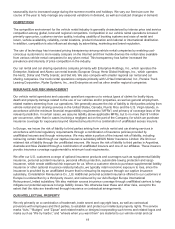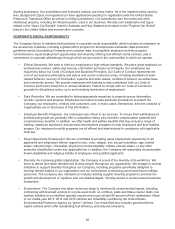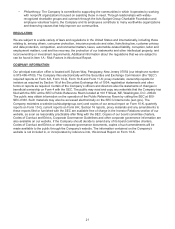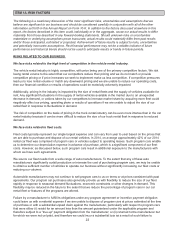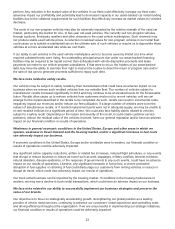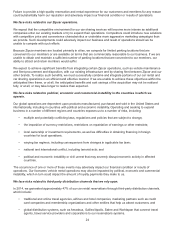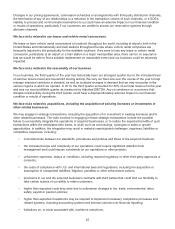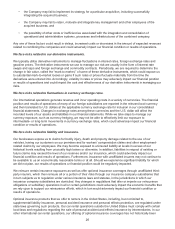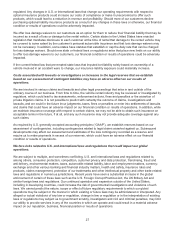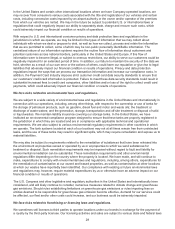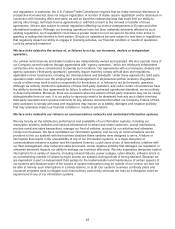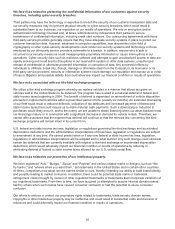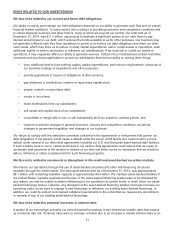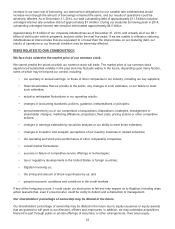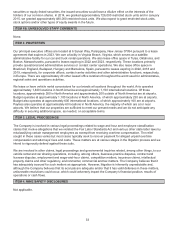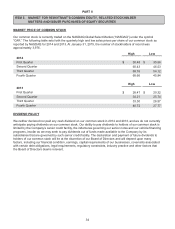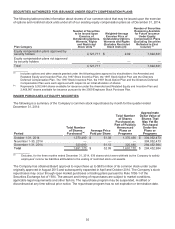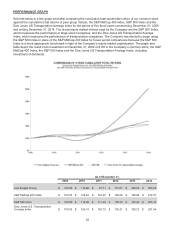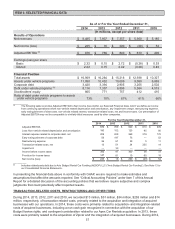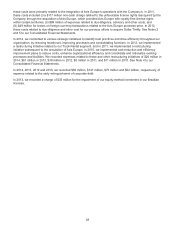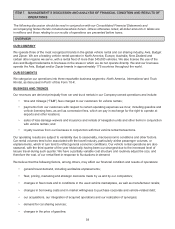Avis 2014 Annual Report Download - page 36
Download and view the complete annual report
Please find page 36 of the 2014 Avis annual report below. You can navigate through the pages in the report by either clicking on the pages listed below, or by using the keyword search tool below to find specific information within the annual report.29
and regulations. In particular, the U.S. Federal Trade Commission requires that we make extensive disclosure to
prospective licensees but does not require registration. A number of states require registration and/or disclosure in
connection with licensing offers and sales, as well as franchise relationship laws that could limit our ability to,
among other things, terminate license agreements or withhold consent to the renewal or transfer of these
agreements. We are also subject to certain regulations affecting our license arrangements in Europe and other
international locations. Although our licensing operations have not been materially adversely affected by such
existing regulations, such regulations could have a greater impact on us if we were to become more active in
granting or selling new licenses to third parties. Should our operations become subject to new laws or regulations
that negatively impact our ability to engage in licensing activities, our financial condition or results of operations
could be adversely impacted.
We face risks related to the actions of, or failures to act by, our licensees, dealers or independent
operators.
Our vehicle rental licensee and dealer locations are independently owned and operated. We also operate many of
our Company-owned locations through agreements with “agency operators,” which are third-party independent
contractors who receive commissions to operate such locations. Our agreements with our licensees, dealers and
agency operators (“third-party operators”) generally require that they comply with all laws and regulations
applicable to their businesses, including our internal policies and standards. Under these agreements, third-party
operators retain control over the employment and management of all personnel at their locations. Regulators,
courts or others may seek to hold us responsible for the actions of, or failures to act by third-party operators.
Although we actively monitor the operations of these third-party operators, and under certain circumstances have
the ability to terminate their agreements for failure to adhere to contracted operational standards, we are unlikely
to detect all problems. Moreover, there are occasions when the actions of third-party operators may not be clearly
distinguishable from our own. It is our policy to vigorously seek to be dismissed from any such claims involving
third-party operators and to pursue indemnity for any adverse outcomes that affect our Company. Failure of third-
party operators to comply with laws and regulations may expose us to liability, damages and negative publicity
that may adversely impact our financial condition or results of operations.
We face risks related to our reliance on communications networks and centralized information systems.
We rely heavily on the satisfactory performance and availability of our information systems, including our
reservation systems, websites and network infrastructure to attract and retain customers, accept reservations,
process rental and sales transactions, manage our fleet of vehicles, account for our activities and otherwise
conduct our business. We have centralized our information systems, and we rely on communications service
providers to link our systems with the business locations these systems were designed to serve. A failure or
interruption that results in the unavailability of any of our information systems, or a major disruption of
communications between a system and the locations it serves, could cause a loss of reservations, interfere with
our fleet management, slow rental and sales processes, create negative publicity that damages our reputation or
otherwise adversely impacts our ability to manage our business effectively. We may experience temporary system
interruptions for a variety of reasons, including network failures, power outages, cyber-attacks, software errors or
an overwhelming number of visitors trying to access our systems during periods of strong demand. Because we
are dependent in part on independent third parties for the implementation and maintenance of certain aspects of
our systems and because some of the causes of system interruptions may be outside of our control, we may not
be able to remedy such interruptions in a timely manner, or at all. Our systems’ business continuity plans and
insurance programs seek to mitigate such risks but they cannot fully eliminate the risks as a disruption could be
experienced in any of our information systems.


